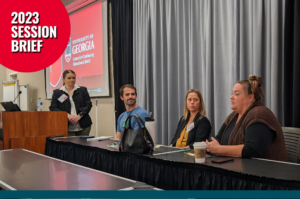By Bella Farris
 In Athens, Georgia, the homeless population is growing so much that the Athens Area Homeless Shelter has not been able to spend out its rehousing budget because there is just not enough available housing in the community, according to shelter director Shea Post.
In Athens, Georgia, the homeless population is growing so much that the Athens Area Homeless Shelter has not been able to spend out its rehousing budget because there is just not enough available housing in the community, according to shelter director Shea Post.
The Athens Area Homeless Shelter receives over $200,000 a year from the federal Department of Housing and Urban Development (HUD) for its rapid rehousing program.
“The last two years we’ve been unable to spend it all because there are literally not enough affordable units here in this community,” Post said on a panel on issues impacting unhoused populations in Clarke County at the 12th annual State of the Public’s Health Conference at the University of Georgia.
Post was joined on the panel by John Morris, Advantage Behavioral Health Services Chair and THRIVE Community Programs Team Lead, and Stephani Witt from the Athens Wellness Clinic.
The data surrounding homelessness in the country shows the issue is getting worse faster, according to Morris. There are barriers that make it difficult for individuals or families to find housing. These can include lack of income or employment, recent evictions, a criminal record, and substance abuse.
When units are available, landlords are likely to choose applicants who do not have these barriers in place, panelists said.
Housing-first is the current solution for addressing homelessness, operating under the idea of housing as a human right. This concept is focused on getting people off the street first. However, it is not always effective. Housing-first has been beneficial for homeless individuals and veterans, according to Post, but it is not as helpful when it comes to families.
Having shelter is not the only thing unhoused populations worry about. There are other challenges that come with homelessness, including some that are caused and worsened by it.
“A lot of my clients tell me that using meth is the best way they have found to cope with life on the streets,” Morris said.
Even completely free resources can be difficult to use. Witt said the Athens Wellness Clinic requires a picture ID, financial records, and a social security card to access their free services. However, some homeless people don’t have these documents.
The number of unhoused people in Athens is typically between 300 and 500, according to Post—though she said that number is likely a significant underrepresentation because the point-in-time-count is based on who can be found on the street or in shelters during the one day, and who is willing to answer the multi-question survey.
Making individuals, practitioners and policymakers aware of the myriad issues that make even the best-intentioned approaches fall flat are important conversations to keep having, the panelists said.
